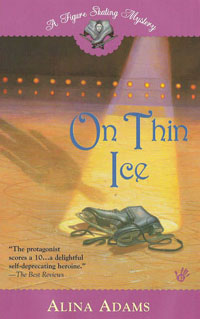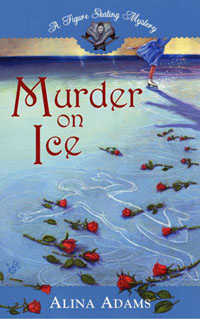LET'S GET PHYSICAL!
America's two best hopes for an Olympic Gold Medal in figure skating, Michelle Kwan and Sasha Cohen both had to sit out the first few competitions of the season due to hip problems. (For an update on the health of other American contenders, click here).
But inuries are nothing new in the world high-stakes ice-skating. Besides the usual broken bones, pulled muscles, torn ligaments, hairline fractures, strains and bruises, the sport has seen some truly unusual ailments, as well.
Two weeks before the 1992 U.S. Championship, a qualifier for the Olympics, ice-dancer April Sargent-Thomas suffered a ruptured ovarian cyst, began hemorrhaging, and had to be rushed to emergency surgery. Her partner, Russ Witherby, was convinced their Olympic dream was over. Yet, six days after leaving the hospital, April disobeyed doctors' orders and returned to the ice. With Nationals only a week away, she could barely move. The team had to start all over again, listening to their music and wracking their brains for a way to change this step, alter that lift, so that April wouldn't be hurt. When they skated their Free Dance at Nationals, it proved the first time they ever performed it from beginning to end since April's surgery. The team finished in first place.
1994 World Bronze Medalist Tanja Szewczenko began suffering foot injuries soon after winning her medal, due to performing in too many exhibitions. Her coach wanted Tanja to drop the exhibitions, and rest for competition. Tanja dropped her coach instead, and moved to a new rink. She missed the 1996-1997 season, however, due to a life-threatening blood virus that doctors, at first, could not diagnose. After a year of inaction, still fragile from weekly blood transfusions, Tanja returned to the ice in 1997, regained her German title, and qualified for the Champions' Series final, where, after an impeccable performance, she finished a close second behind defending champion Tara Lipinski. She also won the Short Program at the 1998 Europeans, finishing 3rd overall. Arriving at the 1998 Olympics, Tanja was considered one of the favorites for the Bronze. Unfortunately, in Nagano, she caught the flu, and regretfully withdrew from the Ladies' event.
For France's Laurent Tobel, though, it was a physical problem that first drove him to, rather than away from, the rink. His immune system was weak, and he needed to be in a cold environment. (A situation reminiscent of 1984 Olympic Champion Scott Hamilton, who, at age two, contracted a mysterious illness that caused him to stop growing. A special diet and exercise was recommended as treatment, and the cold air of skating was thought to be good for his lungs. As he began to train, Scott also began growing again). Once again though, for Laurent, it was a converse physical problem that almost drove him out of skating. When he was fourteen years old, Laurent grew 18 inches in one year. The acceleration weakened his bones, causing shin splints and knee injuries, and wreaking havoc with his balance. He had to relearn every skating move, from stroking to spinning to jumping, before he finally stopped growing at 6' 2''. Citing his hulking size, many urged Laurent to give up skating. (American Karen Kwan, sister of Michelle, watching Laurent at a competition in France, reportedly joked, "There's a monster on the ice. I'm afraid he'll eat me.") But, the 2-time French Junior Silver Medalist vowed to make a come-back. As a last minute addition to the 1997 World Team after the withdrawal of Philippe Candeloro, Laurent skated a comical, more exhibition than competition, Pink Panther program that inspired a standing ovation from the crowd. He finished in 13th place. In 1999, Laurent became the French National Champion.
At the same 1997 World Championship, another French skater, Sophie Moniotte, was attempting a comeback of her own. She and partner Pascal Lavanchy had been as high as 2nd in the World in ice-dance in 1994. But, prior to the 1996 season, Sophie was practicing twizzles when her blade got caught in the ice. She turned. Her foot didn't. Sophie describes it being, "Like in a Bugs Bunny cartoon. I go round and round." She broke her ankle and tore a ligament, needing to wait five months before it was fully healed, and was forced to stay off the ice for almost a year. Sophie and Pascal missed the entire 1995-1996 season, and, although Sophie watched the Worlds on TV, Pascal refused to. In their absence, the French Ice Dance title was won by Marina Anissina and Gwendal Peizerat. When Sophie and Pascal returned to competition in 1996-1997, they could only earn second place at the French nationals. However, determined to "prove we're alive and we kept on working," Sophie and Pascal went on to win the Bronze medal at the 1997 Europeans over their closest rivals.
While Sophie and Pascal were missing in action, their spot on the World podium was taken by a pair of Canadians, Shae-Lynn Bourne and Victor Kraatz. The 2003 World Champions were no strangers to injury themselves. In 1992, Shae-Lynn collided with another skater in practice, and fractured her skull. Doctors told her that if she ever hit the exact same spot again, she could end up a vegetable. Shae-Lynn listened politely, and then went right back out onto the ice to win the Junior Dance Title.
A more serious cranial injury struck down Russian Pair skater Elena Bereznaia in early 1996. She and her then-partner, Latvia's Oleg Shliakhov, were practicing side by side camel spins for an exhibition performance at the Latvian Nationals, when Oleg's blade struck Elena on the side of the head. At first, she didn't realize she'd been hit by the blade, she thought it was the boot, but then she felt herself slowly starting to sink down, and something warm and sticky slithering down her face. She stepped off the ice, still feeling nothing. Her coaches and Oleg told her she was fine, she was just in shock, and maybe would need a few stitches for the bloody cut on her head.
An ambulance took her to the hospital, then left her in the waiting room. It was while she was sitting there, that Elena began to feel progressively worse. By the time a nurse came to ask her name and where she lived, Elena couldn't remember or articulate the information. In addition, she was wearing contact lenses, but, when she tried to tell that to the nurse, she couldn't come up with the right words. Realizing that her skull had been fractured, she was rushed into surgery. Laying on the table, Elena looked up to see her doctor's hands start shaking when he was told that the girl under his knife was a world-class athlete, and he better not make the same mistake here as with his last patient, who had just died.
When Elena woke up after brain surgery, she couldn't speak or move the right side of her body. The delicate eighteen year old, who had lived away from home since the age of twelve when a Soviet Sports Committee visited her Siberian hometown and decreed that she would be good for Pairs, wanted her mother. But, Tatiana Bereznaia was trapped in a hell of her own. Since the break-up of the Soviet Union legislated Latvia an independent country, a Russian citizen like Elena's mother needed a Visa to go there. It took four days before her paperwork was processed.
In the meantime, Elena had Oleg's mother to deal with. The two descended on the hospital immediately after Elena's surgery, urging her to "Stop lazying around and get out of bed," so Oleg and Elena could compete at the Champions' Series final, and the Worlds. But, when Elena's mother finally arrived in Latvia and saw the condition her daughter was in, barely able to move or speak, she put her foot down and announced that there would be no talk of skating until her child was fully recovered.
Horrified when she was told she might not be able to skate for up to six months, Elena resolved to get back on the ice as soon as possible -- because she could think of nothing else she wanted to do with her life. Upon her return to St. Petersburg, where she and Oleg had trained with Tamara Moskvina, therapy helped Elena regain the mobility of her right side, although she still had trouble with some small motor skills like touching her fingers together. Her speech also returned, but with a slight stutter and a feint accent that Russians mistake for an American one.
Elena teamed up with Anton Sikharulidze to win the Olympic Silver Medal in 1998 and the Gold in 2002.
To read about another 2006 Gold medal favorite, Russia's Irinia Slutskaya's, battle with pericarditis, click here.
But inuries are nothing new in the world high-stakes ice-skating. Besides the usual broken bones, pulled muscles, torn ligaments, hairline fractures, strains and bruises, the sport has seen some truly unusual ailments, as well.
Two weeks before the 1992 U.S. Championship, a qualifier for the Olympics, ice-dancer April Sargent-Thomas suffered a ruptured ovarian cyst, began hemorrhaging, and had to be rushed to emergency surgery. Her partner, Russ Witherby, was convinced their Olympic dream was over. Yet, six days after leaving the hospital, April disobeyed doctors' orders and returned to the ice. With Nationals only a week away, she could barely move. The team had to start all over again, listening to their music and wracking their brains for a way to change this step, alter that lift, so that April wouldn't be hurt. When they skated their Free Dance at Nationals, it proved the first time they ever performed it from beginning to end since April's surgery. The team finished in first place.
1994 World Bronze Medalist Tanja Szewczenko began suffering foot injuries soon after winning her medal, due to performing in too many exhibitions. Her coach wanted Tanja to drop the exhibitions, and rest for competition. Tanja dropped her coach instead, and moved to a new rink. She missed the 1996-1997 season, however, due to a life-threatening blood virus that doctors, at first, could not diagnose. After a year of inaction, still fragile from weekly blood transfusions, Tanja returned to the ice in 1997, regained her German title, and qualified for the Champions' Series final, where, after an impeccable performance, she finished a close second behind defending champion Tara Lipinski. She also won the Short Program at the 1998 Europeans, finishing 3rd overall. Arriving at the 1998 Olympics, Tanja was considered one of the favorites for the Bronze. Unfortunately, in Nagano, she caught the flu, and regretfully withdrew from the Ladies' event.
For France's Laurent Tobel, though, it was a physical problem that first drove him to, rather than away from, the rink. His immune system was weak, and he needed to be in a cold environment. (A situation reminiscent of 1984 Olympic Champion Scott Hamilton, who, at age two, contracted a mysterious illness that caused him to stop growing. A special diet and exercise was recommended as treatment, and the cold air of skating was thought to be good for his lungs. As he began to train, Scott also began growing again). Once again though, for Laurent, it was a converse physical problem that almost drove him out of skating. When he was fourteen years old, Laurent grew 18 inches in one year. The acceleration weakened his bones, causing shin splints and knee injuries, and wreaking havoc with his balance. He had to relearn every skating move, from stroking to spinning to jumping, before he finally stopped growing at 6' 2''. Citing his hulking size, many urged Laurent to give up skating. (American Karen Kwan, sister of Michelle, watching Laurent at a competition in France, reportedly joked, "There's a monster on the ice. I'm afraid he'll eat me.") But, the 2-time French Junior Silver Medalist vowed to make a come-back. As a last minute addition to the 1997 World Team after the withdrawal of Philippe Candeloro, Laurent skated a comical, more exhibition than competition, Pink Panther program that inspired a standing ovation from the crowd. He finished in 13th place. In 1999, Laurent became the French National Champion.
At the same 1997 World Championship, another French skater, Sophie Moniotte, was attempting a comeback of her own. She and partner Pascal Lavanchy had been as high as 2nd in the World in ice-dance in 1994. But, prior to the 1996 season, Sophie was practicing twizzles when her blade got caught in the ice. She turned. Her foot didn't. Sophie describes it being, "Like in a Bugs Bunny cartoon. I go round and round." She broke her ankle and tore a ligament, needing to wait five months before it was fully healed, and was forced to stay off the ice for almost a year. Sophie and Pascal missed the entire 1995-1996 season, and, although Sophie watched the Worlds on TV, Pascal refused to. In their absence, the French Ice Dance title was won by Marina Anissina and Gwendal Peizerat. When Sophie and Pascal returned to competition in 1996-1997, they could only earn second place at the French nationals. However, determined to "prove we're alive and we kept on working," Sophie and Pascal went on to win the Bronze medal at the 1997 Europeans over their closest rivals.
While Sophie and Pascal were missing in action, their spot on the World podium was taken by a pair of Canadians, Shae-Lynn Bourne and Victor Kraatz. The 2003 World Champions were no strangers to injury themselves. In 1992, Shae-Lynn collided with another skater in practice, and fractured her skull. Doctors told her that if she ever hit the exact same spot again, she could end up a vegetable. Shae-Lynn listened politely, and then went right back out onto the ice to win the Junior Dance Title.
A more serious cranial injury struck down Russian Pair skater Elena Bereznaia in early 1996. She and her then-partner, Latvia's Oleg Shliakhov, were practicing side by side camel spins for an exhibition performance at the Latvian Nationals, when Oleg's blade struck Elena on the side of the head. At first, she didn't realize she'd been hit by the blade, she thought it was the boot, but then she felt herself slowly starting to sink down, and something warm and sticky slithering down her face. She stepped off the ice, still feeling nothing. Her coaches and Oleg told her she was fine, she was just in shock, and maybe would need a few stitches for the bloody cut on her head.
An ambulance took her to the hospital, then left her in the waiting room. It was while she was sitting there, that Elena began to feel progressively worse. By the time a nurse came to ask her name and where she lived, Elena couldn't remember or articulate the information. In addition, she was wearing contact lenses, but, when she tried to tell that to the nurse, she couldn't come up with the right words. Realizing that her skull had been fractured, she was rushed into surgery. Laying on the table, Elena looked up to see her doctor's hands start shaking when he was told that the girl under his knife was a world-class athlete, and he better not make the same mistake here as with his last patient, who had just died.
When Elena woke up after brain surgery, she couldn't speak or move the right side of her body. The delicate eighteen year old, who had lived away from home since the age of twelve when a Soviet Sports Committee visited her Siberian hometown and decreed that she would be good for Pairs, wanted her mother. But, Tatiana Bereznaia was trapped in a hell of her own. Since the break-up of the Soviet Union legislated Latvia an independent country, a Russian citizen like Elena's mother needed a Visa to go there. It took four days before her paperwork was processed.
In the meantime, Elena had Oleg's mother to deal with. The two descended on the hospital immediately after Elena's surgery, urging her to "Stop lazying around and get out of bed," so Oleg and Elena could compete at the Champions' Series final, and the Worlds. But, when Elena's mother finally arrived in Latvia and saw the condition her daughter was in, barely able to move or speak, she put her foot down and announced that there would be no talk of skating until her child was fully recovered.
Horrified when she was told she might not be able to skate for up to six months, Elena resolved to get back on the ice as soon as possible -- because she could think of nothing else she wanted to do with her life. Upon her return to St. Petersburg, where she and Oleg had trained with Tamara Moskvina, therapy helped Elena regain the mobility of her right side, although she still had trouble with some small motor skills like touching her fingers together. Her speech also returned, but with a slight stutter and a feint accent that Russians mistake for an American one.
Elena teamed up with Anton Sikharulidze to win the Olympic Silver Medal in 1998 and the Gold in 2002.
To read about another 2006 Gold medal favorite, Russia's Irinia Slutskaya's, battle with pericarditis, click here.






0 Comments:
Post a Comment
Links to this post:
Create a Link
<< Home